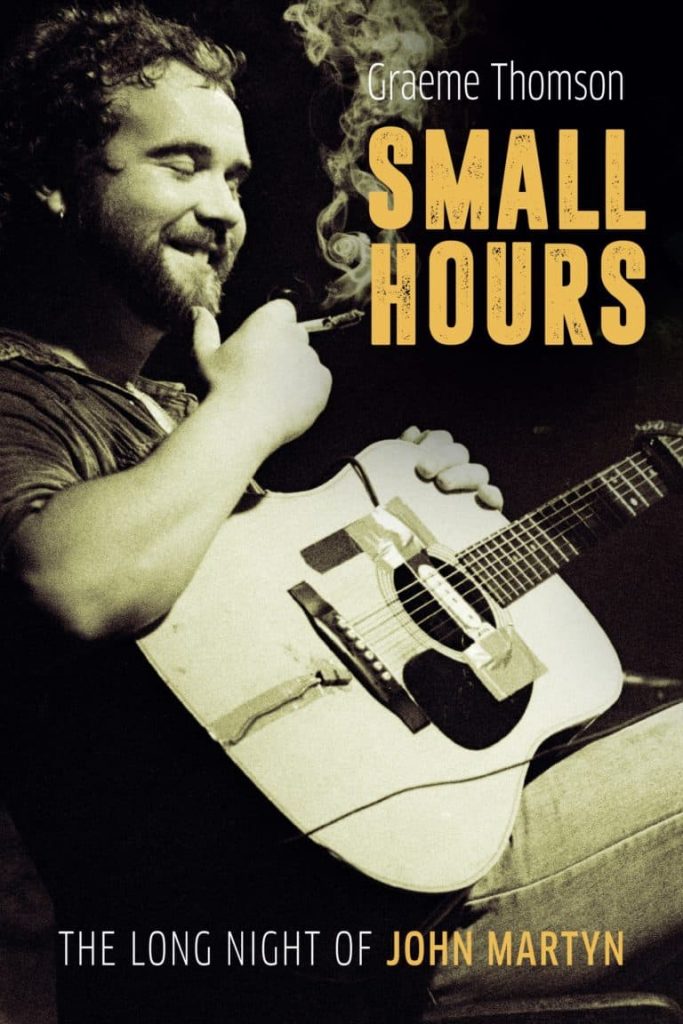The last in Folk Radio UK’s series of exclusive performances marking the publication today of Small Hours, Graeme Thomson’s new biography of John Martyn. It has received glowing reviews from The Observer, MOJO, The Independent, Irish Times, Uncut, The Herald and Shindig!
To finish: a double bill of songs taken from Martyn’s classic 1973 album, Solid Air: Siobhan Wilson performs Over The Hill, and Findlay Napier sings Martyn’s standard, May You Never.
From Small Hours:
The unease which runs through Over The Hill belies the breezy hop and skip in the music, with its twinkly conjuring of caravans and campfires. It is a song of conflict, between the open road and the four walls of hearth and home. The title phrase, of course, can also refer to someone who is past their best. The journey Martyn describes is a homecoming – the run into Hastings on the train rolled through rising countryside before the line dipped down to reveal the town – but also a more ambiguous internal one.
Martyn often spoke about domesticity equating the death of creativity. He was a subscriber to the Cyril Connolly school of cliché that the pram in the hallway is the solemn enemy of good art, yet he also yearned for his family, its wholesome comforts and simple certainties. In Over The Hill, he is worried about ‘my babies’ and ‘my wife’; worried, too, about what they are doing to him, and he to them.
From Small Hours:
‘You could put it into a hymn book,’ says Richard Thompson of Martyn’s best-known and popular composition. ‘It’s a beautiful song.’ The most common thesis is that he wrote May You Never for his friend Andy Matthews, who ran the Soho cellar club, Les Cousins. Then again, Scottish writer and folk singer Ewan McVicar has met ‘three people who told me who that song was written about. All different.’ Others theorise that it was written about Martyn’s own children. Paul Wheeler refutes the idea that it is about, or for, any person in particular. ‘As I remember, he wrote it very much as a signature song. It was a very calculated thing.’ Wheeler recollects that the line about love being a lesson ‘we learn in our time’ was loosely appropriated from Lesley Duncan’s Love Song.
Such utility is the great value of May You Never. It feels usable, relatable. We all know someone about whom it could or should have been written. It is a series of very secular prayers for a wayward sibling-cum-soulmate to keep his woman close, his temper in check, and to always have a warm place to lay his head. That these pitfalls were all directly pertinent to Martyn’s personal hang-ups and weaknesses lends weight to the interpretation that he was, at least partly, singing to himself. Though it remains his most famous song, covered by superstars and bar-stool amateurs alike, he never quite saw what the fuss was about, and at times resented the dominance it came to demand in his catalogue. When I raised this with him, he shrugged and called it a ‘lollipop’, a sweet, simple and insubstantial diversion.
Small Hours is published today by Omnibus Press.
Buy Small Hours – Hardback: Amazon | Kindle: Amazon
Read and watch all book extracts and performances here.

Photo Credits: Siobhan Wilson (Gemma Dagger) | Findlay Napier (Elly Lucas)

